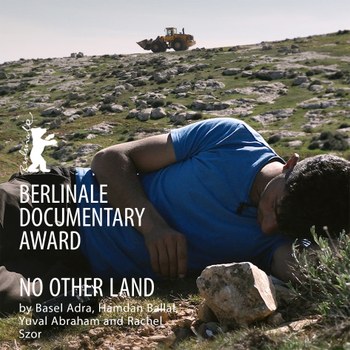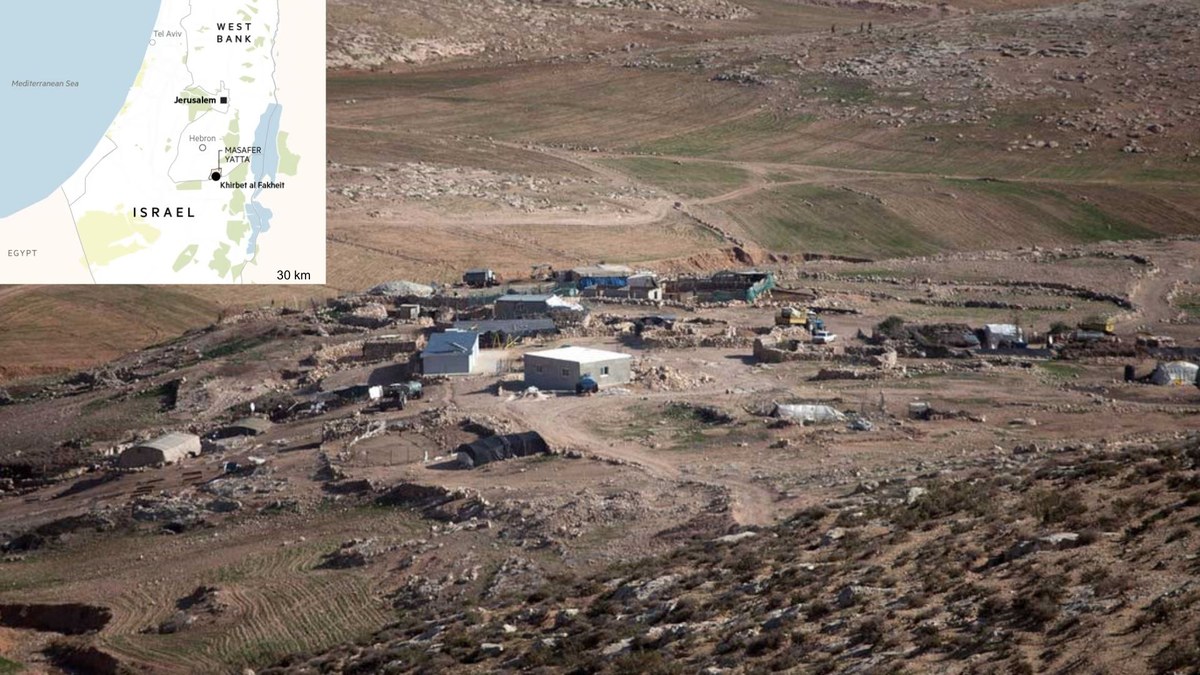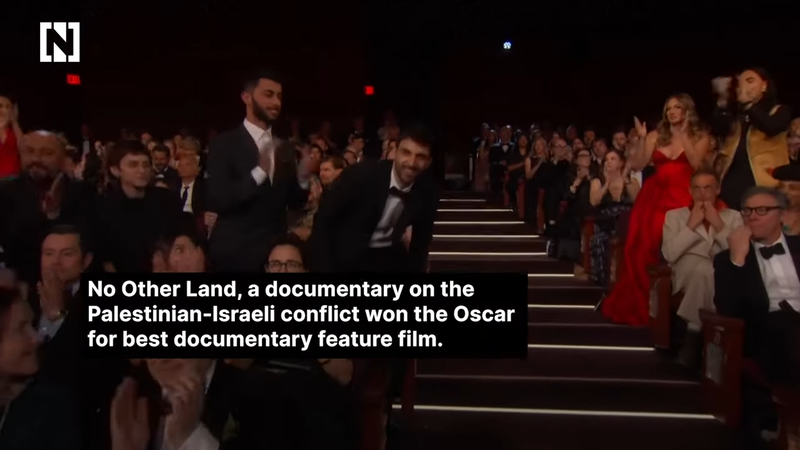No Distribution Land
The challenges behind the documentary film No Other Land: from its production to the post-Oscar controversy.
Pubblicato il 16 giugno 2025 | Arte e Cultura
Articolo a cura di Comuzzo Beatrice, Cusano Carlo, Maestroni Beatrice.
“A sad moment for the world of cinema”, “one-sided”, “inaccurate”,“anti-Israeli propaganda”.
These expressions were used by some politically influential figures in Europe and the United States to describe the documentary No Other Land, which won the Academy Award for Best Documentary Feature Film in 2025. Despite the general critical acclaim and the remarkable cooperation of its directors, the documentary has sparked controversy, because of the events covered and the location where it was filmed and developed.
A long history of violence
The documentary was filmed by four directors – two Palestinians and two Israelis. The Palestinian directors are Hamdan Ballal, behind the camera, and Basel Adra, appearing on screen as one of the film’s central figures. Adra is joined by the Israeli journalist, Yuval Abraham, who completes the directors’ team with Israeli cinematographer, Rachel Szor.
No Other Land chronicles the harrowing reality of Palestinian resistance under Israeli occupation, capturing the story of mass expulsion in Masafer Yatta, an area in the West Bank with an extension of approximately 30 kilometres. This area is part of the C Area of the West Bank, whose civil and military control was claimed by Israel after the 1993 Oslo agreements.
The documentary follows the events in Masafer Yatta from 2019 to 2023, narrating the violence and demolition of buildings performed by Israeli military forces in the area. These systematic brutalities started a long time ago and are continuing with the goal of evicting the Palestinians with the legitimacy of the law and the ostensible reason of liberating space for the shooting range.
Since the 1980s, Israel has designated the Masafer Yatta area as a military firing zone, a status reaffirmed by the Israeli Supreme Court in a 2022 ruling. This decision permits the Israeli military to use the zone for training exercises and has paved the way for the eviction of Palestinian communities living there, affecting over 1,300 residents across eight villages. The Court ruling effectively endorses the transformation of the area into a shooting range for Israeli forces, continuing a decades-long effort to displace Palestinians from their land under the guise of military necessity.
The violence in Masafer Yatta continues to this day. In early May, a group of 20 journalists was invited by Yuval and Basel to visit the village. The directors aimed to provide international media with the opportunity to witness firsthand the violence perpetrated by settlers – particularly after the destruction of Khalet Al-Daba’a, one of the twelve settlements that make up the Masafer Yatta region. However, the Israel Defense Forces (IDF) blocked the press vehicles from entering the area, accusing the journalists of causing a “public disturbance”. This event occurred shortly after the Israeli government announced the establishment of 22 new settlements in the occupied territory, effectively legalizing several of previously unauthorized outposts.
Behind the scenes
No Other Land was produced from 2019 to 2023 through a collaboration between the Palestinian company Yabayay Media and Norway’s Antipode Films. The project also received crucial support from the IDFA Bertha Fund and Sundance Institute.
According to Adra, one of the biggest challenges in making the documentary was condensing thousands of hours of footage into a coherent and compelling narrative that could act not only as a political statement, but also as an authentic depiction of the community’s everyday life. To achieve this, the directors carefully selected those scenes and stories designed to build a progressively escalating narrative.
The documentary builds on footage of Masafer Yatta captured by Basel Adra’s family since his childhood. In this way, Adra tries to pursue his family’s mission, bringing global attention to the realities faced by his community. Prior to 2019, both Adra and Abraham independently shared stories online about demolitions and daily life in Masafer Yatta. Their paths crossed that year, marking the beginning of a collaboration that would evolve into the documentary. Utilizing Adra’s extensive video archive, the directors continued to document unfolding events until 2023. Additional key scenes – including moments featuring Adra and Abraham in a car – were filmed by Rachel Szor.
Filming concluded shortly before the Hamas-led attacks in southern Israel on October 7, 2023, and the film was released in February 2024.October 7, 2023, and the film was released in February 2024.
The challenge of distribution
Distribution is a crucial aspect of the filmmaking process. Without it, a film does not reach audiences and, therefore, remains unnoticed. Typically, film rights are acquired or licensed by a distribution company, which then manages the promotion and release – whether in cinemas, on television, or via digital platforms.
Film festivals represent a key opportunity for attracting distributors’ interest. For example, No Other Land premiered at the Berlin International Film Festival in February 2024, where it won the Best Documentary Award. Following this award, it received recognition from the New York Film Critics Circle and the International Documentary Association. The film has since been acquired for distribution in several countries, including the United Kingdom and France. However, it has encountered significant difficulties securing a distributor in the U.S.
One possible contributing factor is the political polarization and controversy of the subject matter. By comparison, 20 Days in Mariupol – a documentary about Ukrainian journalists during the Russian invasion – won the Oscar for Best Documentary Feature in 2024. It was distributed by PBS and made available on YouTube, Amazon Prime, and the PBS website.
Additionally, Palestinian films often face systemic barriers to distribution. Because the global film industry is largely organized around nation-states, and since Palestine is not recognized as a sovereign state by many countries – including the U.S. – these films frequently encounter classification issues.

No Other Land poster. Source: Berlin International Film Festival
It is important to note that No Other Land is not alone in facing such obstacles. Other politically charged documentaries, such as Union – which explores labour organizing at Amazon – and The Bibi Files – an exposé on Israeli Prime Minister Benjamin Netanyahu – have also struggled to find buyers among major studios and platforms.
To ensure the film distribution, the directors collaborated autonomously with companies, arranging agreements with independent cinemas and theatres. There has been controversy surrounding these efforts. For example, Miami Beach Mayor, Steven Meiner, threatened to cut financial support to the O Cinema in response to its screening of No Other Land, describing the film as “a false one-sided propaganda attack on the Jewish people that is not consistent with the values of our City and residents”. For three weeks in April 2025, the film was available for digital rent, though no major streaming service in the U.S. is currently showing it.
Yet, despite these challenges, No Other Land won an Oscar.
Israeli-Palestinian film No Other Land wins Best Documentary Oscar
Rachel Szor, Hamdan Ballal, Basel Adra, and Yuval Abraham deliver their acceptance speech at the 95th Academy Awards, March 2025. Source: The National News
The aftermath of the Oscar speech
The acceptance speech at the Oscars provoked strong reactions, especially from the Israeli government. Israeli Culture Minister, Miki Zohar, called the Oscar win “a sad moment for cinema”, accusing the film of “distorting the image of Israel” and being a “sabotage” against the Jewish State, especially in the context of the ongoing war and the wounds still fresh after October 7, 2023. Zohar urged Israeli cinemas not to show the film, while several Israeli media outlets condemned it as “propaganda” or “worse than a lie”.
Beyond these verbal attacks, the tense atmosphere escalated into physical violence against one of the directors, Hamdan Ballal. The Palestinian co-director was brutally assaulted by a group of Israeli settlers in his village of Susya, located in Masafer Yatta. Ballal was forcibly detained by Israeli soldiers, blindfolded, and held for 24 hours in a military base, where he was subjected to harsh conditions including being forced to sleep under a cold air conditioner. His co-director Yuval Abraham publicly condemned the assault on social media, describing it as part of a broader strategy to intimidate those documenting and denouncing human rights abuses in the occupied territories. Israeli authorities claimed the detention followed violent clashes involving stone-throwing by Palestinian citizens and Israeli settlers, but witnesses and human rights groups have disputed this account. Ballal was released shortly after, but the event has drawn international attention amid rising tensions following the Oscar-winning documentary’s success.
To share is to do
Winning an Oscar has put the directors’ safety at greater risk. The threats facing Palestinian communities in Masafer Yatta are intensifying, creating an urgent call for action. Basel Adra said he will continue to fight tirelessly for justice, urging audiences and governments worldwide to confront their role in the ongoing conflict and take responsibility for those affected.
The case of No Other Land shows that cinema can still raise awareness, as Basel and Yuval did. They went from Twitter videos to a collective and impressive work that allowed them to reach a wider audience. The camera becomes a weapon to respond to the violence suffered. Sharing becomes an effective tool to circumvent attempts at concealment.
The directors of No Other Land knew this well: they created and distributed the documentary without the backing of a major American company, because they strongly believed in the power of a joint narrative between Palestinians and Israelis, because they knew that certain stories must not remain invisible.
References
Al Jazeera Staff. “What Oscar-Winning No Other Land Is About and Where You Can Watch It.” Al Jazeera, March 3, 2025. https://www.aljazeera.com/news/2025/3/3/what-oscar-winning-no-other-land-is-about-and-where-you-can-watch-it.
Antipode Films. “No Other Land.” Antipode Films. https://www.antipodefilms.com/portfolio_page/no-other-land/.
Arab News. “Palestinian Group Criticizes No Other Land.” Arab News, April 4, 2025. https://www.arabnews.com/node/2595919/middle-east.
Bradshaw, Peter. “No Other Land Review – Stark, Unflinching West Bank Documentary.” The Guardian, November 9, 2024. https://www.theguardian.com/film/2024/nov/09/no-other-land-review-stark-unflinching-west-bank-documentary.
CIDSE. “Halting Evictions of Palestinian Families from Masafer Yatta.” CIDSE, May 17, 2022. https://www.cidse.org/2022/05/17/halting-evictions-of-palestinian-families-from-masafer-yatta/
Dobson, Patricia. “No Other Land Filmmakers Discuss Making the Palestinian-Israeli Documentary.” Screen Daily, December 6, 2024. https://www.screendaily.com/features/no-other-land-filmmakers-on-making-palestinian-israeli-documentary-the-camera-is-the-one-and-only-tool-we-have/5199890.article.
DW. “October 7 Hamas Attacks on Israel: A Year Later.” DW, April 10, 2024. https://www.dw.com/en/october-7-hamas-attacks-on-israel-a-year-later/a-70399696.
Gilani, Maria. “The Oslo Process: The Facade of Peace Between Palestine and Israel.” E-International Relations, October 12, 2024. https://www.e-ir.info/2024/10/12/the-oslo-process-the-facade-of-peace-between-palestine-and-israel/.
Goodfellow, Melanie. “Berlinale Head Tricia Tuttle Defends No Other Land Filmmakers Against Antisemitism Charges.” Deadline, November 14, 2024. https://deadline.com/2024/11/berlinale-head-tricia-tuttle-no-other-land-filmmakers-antisemitism-1236176632/.
Haynie, Olivia. “No Other Land: Where to Watch the Oscar-Winning Documentary in the U.S.” Forward, March 3, 2025. https://forward.com/culture/film-tv/700861/no-other-land-watch-oscar-stream-united-states/.
Horton, Adrian. “No Other Land Review – Powerful Israel-Palestine Documentary Is Essential Viewing.” The Guardian, September 30, 2024. https://www.theguardian.com/film/2024/sep/30/no-other-land-review-palestinian-israeli-documentary
Il Post. “Masafer Yatta: The Struggle for Land in the West Bank.” Il Post, February 17, 2025. https://www.ilpost.it/2025/02/17/masafer-yatta/.
Il Post. “No Other Land Distribuzione: Dove Vederlo in Italia.” Il Post, March 3, 2025. https://www.ilpost.it/2025/03/03/no-other-land-distribuzione/.
Martinez, Alexandra, Carolyn Copeland, and Rashmee Kumar. “No Other Land Wins Oscar: A Milestone for Palestinian Cinema.” Prism Reports, March 11 2025. https://prismreports.org/2025/03/11/no-other-land-oscars/.
Oscars.org. “98th Academy Awards Qualifying Festival List.” Oscars.org, October 2024. https://www.oscars.org/sites/oscars/files/2024-10/98_Full_Qualifying_Festival_List_Combined.pdf?VersionId=YVXaJyqb.UTWjmkMGhLoIeTdWysel5Jg.
Shotter, James. “Palestinian Villagers Lose 20-Year Legal Fight to Hang on to Homes.” Financial Times, July 24, 2022. https://www.ft.com/content/529248f5-2cfc-4eb8-8f3d-d355a11dcf9c
Tracy, Marc. “No Other Land Faces Distribution Challenges in the U.S.” New York Times, December 18, 2024. https://www.nytimes.com/2024/12/18/movies/no-other-land-documentaries-distribution.html.

